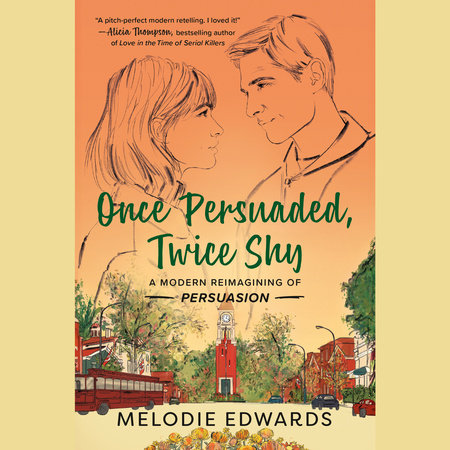READERS GUIDE
Reader’s Guide
Once Persuaded, Twice Shy by Melodie Edwards
Discussion Questions:1. Jane Austen’s final novel, Persuasion (1817), is essentially a story of two people yearning across an imagined barrier of hurt from their past. Getting them to acknowledge their regret, forgive, and relaunch their romantic love is the journey of the story. Do you know people who’ve reconnected with long-lost loves through social media or reunions and felt those past sparks? Or does your mind wander back to a high school or college sweetheart and wonder, Why did we split?
2. A small historic town like Niagara-on-the-Lake has its own culture. You might want to look up the wonderful artworks of Trisha Romance, who visited as an art student and made a career of painting the beautiful buildings and houses. Life there is lived in the present, with an ever-constant view of celebrating and preserving the military and pioneer past. How does this setting reinforce the themes for a modern reimagining of Persuasion?
3. Anne is highly educated and well raised and comes from an influential (in some ways privileged) family, and yet she has matured into what many would call a “workhorse” in that she serves and prioritizes others while her own needs are ignored or suppressed. What “workhorse” people have you observed, or does the description fit you? What drives this behavior? Is it fear; excess energy; a need for
praise; an arrogance of superior competence; a mangled self-worth? What is driving Anne?
4. Embarrassment. We all remember embarrassing moments that are riveted into our memories. Anne is also upended and loses her very
practiced professional calm and competence when she and Ben are repeatedly tossed into close proximity by awkward social or business circumstances. For Anne it is particularly difficult to remain professional, but does Ben seem similarly affected by these encounters? What stance does he take and how does it change as the novel progresses?
5. What did you think of the comedic antics of Double-Oh-Goose as another means of testing Anne’s composure, particularly at the Pumpkin Festival? What inner motivation do Ben’s actions reveal during the chaos of this event, while on his hot date with Sabrina?
6. Vidya and Emmie share an earnest desire to help and support Anne. Why do they miss the mark? And why does Anne resist?
7. What prompts Anne to finally turn the focus on herself when prepping to hike the gorge? Is this the best approach to reviving her former self?
8. Anthony and Ben have much in common in terms of their professional presentation, but their personal conduct hints at differences. In the restaurant dinner scene, there is some competitive posturing. What do you learn about the character and the values of each man? How are they different?
9. Realizations and self-reflection glimmer slowly for Ben over the novel, but what prompts Ben’s epiphany about being dumped by Anne eight years ago? Was her mother justified to be concerned about Ben as a life partner, or was she projecting too much, based on her own romantic choice? Most of us have given relationship advice, willingly or reluctantly, at some point. How did your advice pan out?
10. We always know that Anne yearns for Ben and has regrets, but at what point specifically did you feel sure Ben gains the confidence to try for Anne again? Can you track back through their scenes to see the pattern of his distant but stalwart offers of service and care?
11. Anne and Ben are on solid footing by the end of the novel, and probably always were, so did the eight years apart serve a useful purpose? For Ben? For Anne? Or was it all precious lost time, unnecessary yearning? How can people be romantically risk averse? How do they construct barriers and obstacles with feelings such as personal pride or fear of humiliation, rejection, or failure?

